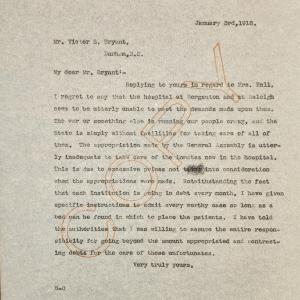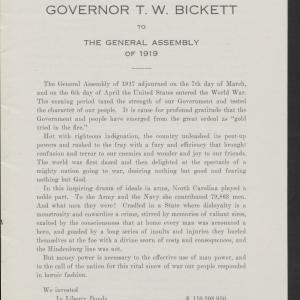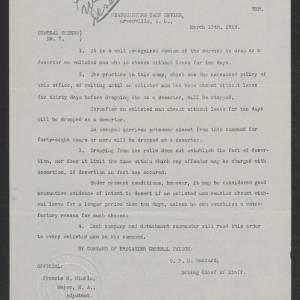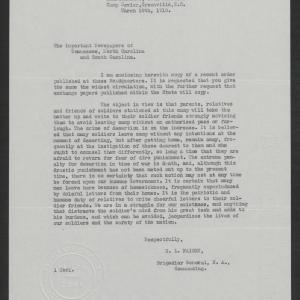- Transcription
Walter Reed General Hospital,
Washington, D? C.
December 22nd, 1919.
Hon. T. W. Bickett,
Govenor of North Carolina,
Raleigh, N.C.
Dear Mr. Bickett:--
I am taking the liberty of writing you to ask your support in behalf of a retirement bill for Reserve and National Guard officers seriously wounded in the late war. As the law now stands Regular Army officers, Provisional Officers and Reserve Officers of the Navy and Marine Corps only are retired for disability. It is our desire, through the American Legion, to have this discrimination corrected.
I understand that Secretary of War Baker has made a statement that 95% of the line officers of the combat divisions in France were emergency officers, and I can well believe this to be true, as I happen to have served in a regular regiment. These officers took the same responsibility, did the same work, performed the same duties, and took the same risks as those of the regular service. They were paid the same and had all the responsibilities and privileges of the regular officers. Under the law, officers of the Regular service who are made unfit for further duty as an incident of the service are retired from active duty and paid three-fourths of the pay of their rank. This has been interpreted to mean those of the regular service only. The others, regardless of how badly they are disabled or how old they may be, are discharged with compensation based on $30.00 permonth as the maximum, except in cases of permanent and total disability, in which case they get $100.00 per month. If the President approves the Sweet Bill the maximum will be $80.00 per month.
I will cite just two cases as a comparison to show the present unjust discrimination: Colonel of the 109 Field Artillery, who was wounded in action, in France, causing the loss of his right leg and also a head wound. He is discharged from the service on a percentage disability based on $30.00. This Colonel is sixty years of age. He had served twenty years in the National Guard. Next the case of a yound first lieutenant, who, given a provisional appointment from a training camp. and after a slight leg injury in a railroad wreck in France, is retired on three-fourths pay. I know personally of these two cases, and many others i might cite, but the above I believe is enough.
Many Congressmen have seen the injustice of this discrimination and one of them, Mr. Mason, has drafted a bill to correct this. This bill has been in committee since last Spring. It was held up, I understand, by the objection of Secretary Baker. His reasons were that when the regular officer is disabled he is not fitted to make his way in civilian life because he has made the service his life work. It is the West Pointers own boast that men from the Military Academy make a better success in civilian life than the average graduate from other colleges. Is the Regular officer with a flat foot and, a good education worse off than the Reserve or National Guard officer with an amputation? Is one any worse fitted for his life work than the other?
We deem this an unjust discrimination, and very detrimental to the morale of these disabled men, and I would ask that you lend your support and use your great influence to have this Mason Bill, (H. B. #4987) or a similar bill made a law.
I am not asking this, nor writing you in my own behalf, as it is very improbable that I would come under these provisions, as I have recovered greatly and will be discharged in a few days, but I do urge it most earnestly for the benefit of those seriously wounded and greatly handicappen men whom I have seen leaving the service maimed for life without adequate provision being made for them, and seeing others just simply lucky enough to be commissioned differently, discharged on three-fourths pay of their rank. In justice to those men I again urge you to help win this fight.
With my highest personal regards, and with all good wishes of the season, I am,
Sincerely yours,
Norfleet S. Smith
1st Lieut. Inft.
Date:
Sender:
Recipient:
Related People:
Repository:
Collection:
Places:
»» »» Washington, D.C.






